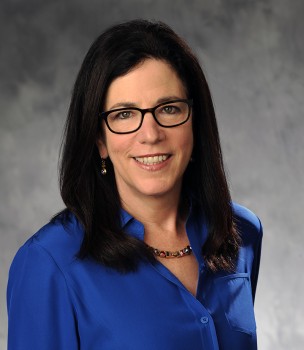Ed.D. - Psycholinguisitics
Harvard University - 1994

Pamela Rollins
Professor - Department of Speech, Language, and Hearing
Research Interests: Social underpinnings of language with emphasis on intervention efficacy in culturally and linguistically diverse autistic children
Professional Preparation
M.S. - Communication Disorders
University of Wisconsin - 1983
University of Wisconsin - 1983
B.S. - Speech Pathology and Audiology
Boston University - 1981
Boston University - 1981
Research Areas
Research Interests
Dr. Rollins research has emphasized using behavioral paradigms to understand the dynamics of infant/child social interactions and social experiences as predictors of social, communication and language development. She investigates the social underpinnings of joint attention, word learning and language development. Dr. Rollins has extended this work to children with autism spectrum disorder (ASD), charting developmental trajectories and conducting translational studies. Her current research emphasis is on intervention efficacy in culturally and linguistically diverse autistic childrenPublications
Deng, Shijian, Erin E. Kosloski, Siddhi Patel, Zeke Aharon Barnett, Yiyang Nan, Alexander Kaplan, Sisira Aarukapalli, William T. Doan, Matthew Wang, M., Harsh Singh, Pamela R. Rollins, and Yapeng Tian (2024). Hear Me, See Me, Understand Me: Audio-Visual Autism Behavior Recognition. IEEE Transactions on Multimedia.
- publications
- publications
Kosloski, E., Patel, S., Rollins, P.R., (2024) The role of Pathways Early Autism Intervention in Improving Social Skills and Respeto for young Hispanic autistic children. Journal of Autism and Developmental Disabilities. Journal of Autism and Developmental Disorders. 10.1007/s10803-024-06419-x
- publications
- publications
De Froy, A., & Rollins, P. R. Task-Related Differences in the Gesture Production of Young Autistic Children. International Journal of Language & Communication Disorders. 10.1111/1460-6984.13033
- publications
- publications
Rollins, P. R., Rangel-Uribe, C., Rojas, R., & Brantley, S. (2023). Examining Cultural and Linguistic Sensitivity of Pathways Early Autism Intervention with Hispanic Families. Journal of Autism and Developmental Disorders, 1-14. - publications
De Froy, Adriane, & Pamela Rollins. (2023) The cross-racial/ethnic gesture production of young autistic children and their parents, Autism and Developmental Language Impairments. - publications
Rollins, Pamela, & Adriane De Froy, Reexamining Pathways Early Autism Intervention in Children Before and After the Third Birthday: A Randomized Control Trial. Journal of Autism and Developmental Disorders, (2022): https://doi.org/10.1007/s10803-022-05599-8. - publications
Rollins, Pamela R, Adriane De Froy, Sebastian Gajardo, Sara Brantley, Pragmatic Contributions to Early Vocabulary and Social Communication in Young Autistic Children with Language and Cognitive Delays. Journal of Communication Disorders, (2022): https://doi.org/10.1007/s10803-022-05599-8
- publications
- publications
De Froy, A., Sims, M., Sloan, B. M., Gajardo, S., Rollins, P.R., (2021). Differential Responses to Child Communicative Behavior of Parents of Toddlers with ASD. Journal Autism & Developmental Language Impairments, 6 (2021). 1-15 - publications
Appointments
Professor
The University of Texas at Dallas [2018–2021]
The University of Texas at Dallas [2018–2021]
Associate Professor
The University of Texas at Dallas [2000–2018]
The University of Texas at Dallas [2000–2018]
Founding Director
UTD/Early Communication, Language and Social Skills preschool [2003–2009]
UTD/Early Communication, Language and Social Skills preschool [2003–2009]
Assistant Professor
The University of Texas at Dallas [1994–2000]
The University of Texas at Dallas [1994–2000]
Special Faculty Appointment
Southwestern Medical School [2006–2008]
Southwestern Medical School [2006–2008]
Teaching Fellow
Harvard Graduate School of Education [1989–1990]
Harvard Graduate School of Education [1989–1990]
Research Assistant
Harvard Graduate School of Education [1988–1994]
Harvard Graduate School of Education [1988–1994]
Speech/ Language Pathologist
Brighton Early Intervention Program, Brighton, MA [1985–1987]
Brighton Early Intervention Program, Brighton, MA [1985–1987]
Speech/ Language Pathologist
Emma Pendleton Bradley Hospital, Providence, RI [1984–1985]
Emma Pendleton Bradley Hospital, Providence, RI [1984–1985]
Projects
Presentations
Words are not enough: Intervention strategies that promote social attention and interaction in autistic children.
BF Skinner Invited Address. Association for Behavioral Analysis International Convention, (May 2024).Current theories suggest that mechanisms for language development change over the course of infancy and early childhood. In neurotypical infants, initial perceptual processing mechanisms essential for word learning give way to more advanced social strategies critical for the development of social language. Language intervention for autistic children often leverages perceptual processing by creating an association between a referent (i.e., object or picture) and the corresponding word, thereby promoting word learning. However, this intervention strategy often fails to facilitate the social language needed to share information and for interpersonal communication. Recent research suggests that naturalistic developmental behavioral interventions (NDBIs) that encourage early dyadic social interactions may stimulate the social brain networks, thereby improving fundamental social attention (i.e., social orienting and joint attention) and social language in young autistic children. This presentation will discuss the theoretical underpinnings of these claims, emphasize the importance of social language as an intervention outcome, and provide empirical evidence supporting the efficacy of NDBI approaches in promoting social attention and reciprocal social language development in young autistic children from culturally and linguistically diverse backgrounds.
Additional Information
Certifications & Licenses
- Certificate of Clinical Competence, American Speech-Language-Hearing Association, 1984 - present
- Licensed Speech-Language Pathologist, TX State Board of Examiners for Speech-Language Pathology and Audiology
News Articles
Professor Receives Grant for Study of Autism Intervention Program
 A UT Dallas researcher has been awarded a grant from the State of Texas to evaluate an early intervention program for children with autism spectrum disorder (ASD) that could change the way the state administers early intervention for these children.
A UT Dallas researcher has been awarded a grant from the State of Texas to evaluate an early intervention program for children with autism spectrum disorder (ASD) that could change the way the state administers early intervention for these children. The grant — for more than $980,000 — is for research on a community-based program for toddlers called Pathways Early Autism Intervention Program.
“Our previous study has shown that Pathways is a very effective model for supporting young children diagnosed on the autism spectrum,” said Dr. Pamela Rollins, associate professor in the School of Behavioral and Brain Sciences. “Now we will take a closer look at the program and one of its specific components — eye contact.”
Robots Help Teach Social Skills to Kids with Autism Spectrum Disorder
 Robots and humans socialize frequently in pop fiction — think of Wall-E and Star Trek: The Next Generation. Now, a UT Dallas researcher is giving the fantasy of robotic friends a practical edge with a robot that teaches social skills to children with Autism Spectrum Disorder (ASD).
Robots and humans socialize frequently in pop fiction — think of Wall-E and Star Trek: The Next Generation. Now, a UT Dallas researcher is giving the fantasy of robotic friends a practical edge with a robot that teaches social skills to children with Autism Spectrum Disorder (ASD).Dr. Pamela Rollins, associate professor in the School of Behavioral and Brain Sciences, explained that individuals with ASD often have social anxiety. Learning social interactions via a less threatening interface — a robot — may help patients better identify emotions and use specific social skills with humans, like holding a conversation.